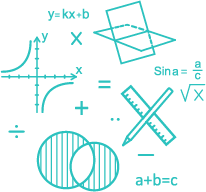History
The Department of Applied Mathematics at NCHU was established in 1961 and was Taiwan’s first Applied Mathematics department. This department has over 40 years of development behind it and, therefore, has strong mathematics courses, library resources, and plenty of computers and software available. The graduates of the department have received much praise for their level of education upon leaving the program. In order to comply with the needs of the technological and industrial communities, the departmental courses and researches will always adapt to them. Hence, the department will focus on educating in applied analysis, applied statistics, applied mechanics, development and applications of mathematic statistical models, and computer skills. This department is one of the nation’s best at uniting the use of computers and applied mathematics.
In 1981, the department established a master’s program and in 1988 set up a doctorate program as well. The post-graduate program has seen growth every year and the program sets national mathematics and applied mathematics graduate program enrollment records every year.
Research
In 2001, 2002, and 2003 thirty-nine professors in this department received the National Science Society’s Research Award. From 1999 to 2002 the department has published about 84 SCI papers. It is obvious that the professors of NCHU Applied Mathematics Department are just as involved in research as they are in educating. From 2001-2003 the department actively petitioned for NT$17,692,500 in research grants, an average of NT$5,897,500 per year, increasing the quality of research.
Undergraduate Course material
In addition to strengthening the overall understanding of fundamental mathematics and its applications, the department allows sophomores to choose, according to interest, between applied analysis, applied statistics, and applied dynamics as a major course of study. The department also has opened fundamental courses in information technology, mathematics, statistics, dynamics, that allow students adapt to the computer and technology age. For those students that choose to focus on applied statistics, there is a heavy focus on computer mathematics training and developing statistical models. These are the information management and analytical tools needed to prepare the nation’s managers and leaders of the future. For students choosing an applied dynamics focus, we strengthen the students fundamentals in mathematical engineering which some engineering departments lack. There are also courses designed to provide a deep understanding of engineering mechanics, mathematic models, and on applying computer technology in solving difficult engineering problems. The department has also developed courses in computer drafting and design analysis.

Department Goals
The department is working towards its goals of strengthening fundamental mathematics, applied mathematical research, computer systems, and the combined use of all of these resources so that this department can establish itself as not only the most popular applied mathematics program in Taiwan, but also to be recognized internationally. In order to accomplish this goal, the department has the following plans:
 Magnifying and strengthening cooperation with industry and research centers.
Magnifying and strengthening cooperation with industry and research centers.
 Strengthening our computer and auxiliary resources to assist in research development.
Strengthening our computer and auxiliary resources to assist in research development.
 Increasing educational presentations and symposiums to increase the quality of academic learning.
Increasing educational presentations and symposiums to increase the quality of academic learning.

Activities
- Support of On and Off Campus Research: The department’s professors assist in data collection and analysis for the school’s industrial and agricultural research.
- Educational Symposiums: In order to increase research developments and stimulate academic discussions, the department holds frequent research presentations and talks. From 2001-2003 the department held 60 such presentations.
- Computer and Technology Seminars: In order to keep up with developments in the industrial and business industries the department provides the following programs
- Using the computer facilities of the department, we hold information classes and computer skills training courses. Over 10,000 people have attended computer-training courses provided by the department.
- In 2002, to comply with the education ministry’s declaration that “teachers of all subjects should have mathematics as a secondary focus”, the department provides mathematics education opportunities to non-mathematics teachers from public and private high schools and junior high schools. 31 teachers have completed this course.
- In 2003, thirty-nine teachers attended these courses.

General situation of alumni
Through the 2002 school year more than half of our students have continued education after graduating from the department. Most have decided to pursue computer science, statistics, engineering (structural mechanics, aeronautics, machinery), industrial engineering, management, and mathematics.
Out post-graduate students have been welcomed into many varying positions in top companies including Chung Shan Scientific Research Center, the Central Research Center, aeronautical research, electronic research, communication and information research, and teaching positions in many universities.
Department Library
The departmental library contains over 10,000 publications and over 300 periodicals with subjects ranging from mathematics, statistics, applied mathematics, computational science, engineering mechanics, operation research, information science, etc. The library also contains over 100 types of computer software, CD-ROM, internet information, and electronic periodicals. No matter if you choose to read a publication in the library, check resources out, or use the internet to find information there are no time restrictions. A reading area is provided as well as computer labs for students who wish to study independently or search the web. Library hours are Monday through Friday from 8:00 am until 6:00 pm.
Lab
511 Room High Performance Computing Lab
711 Room Institute of Statistics Consultation



 Magnifying and strengthening cooperation with industry and research centers.
Magnifying and strengthening cooperation with industry and research centers. Strengthening our computer and auxiliary resources to assist in research development.
Strengthening our computer and auxiliary resources to assist in research development. Increasing educational presentations and symposiums to increase the quality of academic learning.
Increasing educational presentations and symposiums to increase the quality of academic learning.

